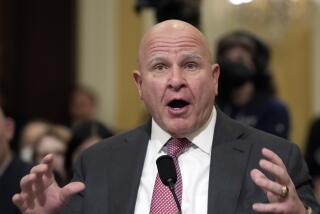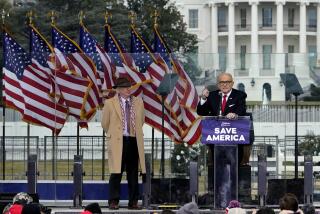Longtime Reagan Advisers Seeking Regan’s Ouster
- Share via
WASHINGTON — Key personal advisers Michael K. Deaver and Stuart K. Spencer are scheduled to meet with President Reagan next week in what could be the climax of a campaign by some longtime Reagan confidants to oust Donald T. Regan as the President’s chief of staff, sources close to the President said Friday.
Deaver and Spencer, supported by First Lady Nancy Reagan, plan to advise Reagan that his presidency will be seriously hampered during his final two years unless he ousts Regan and takes other strong steps to address the Iranian arms-and-hostages scandal, the sources said.
The President’s decision to meet with Deaver and Spencer, which has not been announced by the White House, came as pressure intensified for Reagan to dump not only Regan, but CIA Director William J. Casey.
“The focus right now is on Regan,” said one former Reagan aide who maintains close ties to the White House. “But Bill Casey has got to go too, not just because of his role in the Iranian arms deal but because he’s lost credibility with Congress.”
Deaver, although being investigated by an independent counsel in connection with lobbying activities since he left his post as White House deputy chief of staff in May, 1985, has retained close ties to the Reagans and confers frequently with Mrs. Reagan.
Deaver Role Confirmed
The White House confirmed Friday that last week Deaver arranged for elder statesmen from both parties to confer with the President about how to deal with the arms scandal. Robert S. Strauss, former national chairman of the Democratic Party and an adviser to President Jimmy Carter, and William P. Rogers, President Richard M. Nixon’s first secretary of state, both met with Reagan out of the presence of Regan.
If the chief of staff was aware of the meeting, said White House spokesman Larry Speakes, “he knew about it either when it occurred or shortly thereafter.”
Spencer will fly Tuesday to Washington from Los Angeles, where he is a political consultant. He has expressed serious concern about the political fallout from the scandal and, according to a friend, declared: “We’ve got to get this thing straightened out.”
Deaver, Spencer and Nancy Reagan have collaborated in the past on crucial personnel problems confronting the President. Among other things, they were influential in Reagan’s decision at the beginning of his Administration to name James A. Baker III instead of Edwin Meese III, the current attorney general, as White House chief of staff. Meese, a longtime Reagan associate from California, had made a strong bid for the post.
‘Nobody’s for Him’
The three of them hope to “work out a scenario where Regan will take himself out during the holidays or right after,” one source said. “He’s got to go because absolutely nobody’s for him. Even some of his own staff would like to tell him he has to go, but they don’t dare. Everybody’s on board on this one except the ‘old man’ (Reagan).”
Regan has been criticized for failing to adequately manage the White House staff during the Iranian arms sale operation. He has insisted he knew nothing about the diversion of some arms sale profits to the Nicaraguan rebels, a scheme allegedly carried out by Marine Lt. Col. Oliver L. North, the National Security Council staff member who has been fired by the President.
However, Reagan, who has a close working relationship with his chief of staff, has repeatedly said he does not intend to fire Regan or anyone else as a result of the Iranian arms matter. And Patrick J. Buchanan, the combative White House communications director, said Friday he has “no reason to believe the President now or in the future intends to separate himself” from Regan.
Buchanan, who complained that few Republicans have joined him in publicly defending Reagan’s handling of the scandal, also said that some who have been critical of the President should be exposed to political retribution. He mentioned no names and did not elaborate.
Digging In His Heels
Some Reagan associates say that the President is so angry and frustrated by the pressure to oust Regan that he is digging in his heels and dismissing any suggestion of asking for his resignation.
“One thing is clear,” said a longtime Reagan adviser who served him both at the White House and in the California governor’s office. “It doesn’t matter whether Stu Spencer or anybody else comes back, the President isn’t going to fire Don Regan based on what’s been disclosed to date. And it’s clear Don isn’t going to leave on his own. That doesn’t mean he can’t be forced out some time, depending on how things go. But right now they’re hanging tough, and they seem to think the pressure will be lightening up a little bit.”
In recent days Regan’s closest aides, including senior assistant Dennis Thomas, have contacted several former presidential aides from Reagan’s first term and told them Regan intends to “tough it out” but would like to have their advice on how he should deal with the controversy.
Two of the former presidential aides who were contacted said their advice was that Regan should resign in an effort to help restore the President’s own credibility in the Iranian arms matter.
Aides Called ‘Defensive’
Regan’s aides “were defensive and said that Regan should stay because he was critical to the continuity of the Administration’s budget and other programs,” said one of the former presidential aides. “I told them it was highly unlikely the President’s credibility could be rejuvenated as long as the top staff leadership at the White House remains as is.”
The White House has been preoccupied with dealing with the scandal since it was exposed by a Beirut magazine six weeks ago, according to Buchanan and other White House aides.
But the President, speaking to the American Legislative Exchange Council on Friday, insisted the controversy would not stop the Administration from the daily work of running the government.
He again conceded that mistakes had been made in carrying out the Iranian policy, but said: “We cannot and will not let this stop us from getting on with the business of governing.”
Despite criticism by Republican leaders in Congress that he has not delivered on a promise of full disclosure, Reagan declared: “I’ll not be satisfied until all the facts are before the American people. That’s what we’ve pledged to do, and we can be proud that the constitutional process is working.”
Dole Asks Disclosure
In another development Friday, Senate Majority Leader Bob Dole (R-Kan.), called on Vice Adm. John M. Poindexter, Reagan’s former national security adviser, and North to demonstrate their patriotism by disclosing to Congress everything they know about the Iranian arms deal and the diversion of profits from the arms sale to the Nicaraguan contras.
Poindexter resigned and North was relieved of his White House duties after the diversion of funds was disclosed. Both have invoked their Fifth Amendment rights against self-incrimination in refusing to testify before congressional investigating committees.
In a letter published in the Washington Post, Dole said: “It’s time for them or anyone else still in the Administration who knows anything about this affair to go to the President and tell everything.”
Responding to Dole’s suggestion, Speakes told reporters:
“The President would very much like to have those two individuals cooperate fully with the Congress, to tell the full story, to tell everything they know, to tell it in open session. At the same time, he recognizes that they certainly have their rights and the advice of their counsel.
“The President hopes that they will find a way to speak openly, and to speak truthfully, and to speak in detail on these issues, and do it as quickly as possible,” the spokesman said.
Rejects Private Talks
At the same time, however, he adamantly rejected suggestions by Senate Republican leaders that the President question them in the privacy of the Oval Office to determine what they know about the operation.
If the President conducted such a session, Speakes said, “and then reported to the American people on what he learned from that, I think he might open himself to criticism by interjecting his own views, opinions or whatever. . . . “
“Those individuals are under no obligation to the President, no other obligation to the President than they would be to a congressional committee to waive their constitutional rights,” he said.
More to Read
Sign up for Essential California
The most important California stories and recommendations in your inbox every morning.
You may occasionally receive promotional content from the Los Angeles Times.










